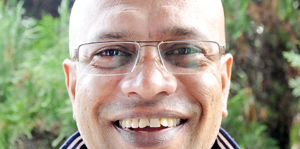Let’s see,are you happy?
The word happiness, the entomological dictionary tells us, is derived from the Middle English word hap meaning luck. Therefore the original meaning meant characterised by good luck or being fortunate. The meaning however has changed over the years. The Merriam-Webster dictionary defines happiness as, a state of well-being and contentment or as a pleasurable or satisfying experience.

Martin Seligman, a psychologist from the University of Pennsylvania who has written extensively on positive psychology, says there are three kinds of happiness and that happiness is not a mere emotion or state but a way of life. The first such kind is the pleasant life which tries to have as many pleasant emotions as you can and learning the skills to improve such experiences. This is the hedonistic cinema view of life where happiness is the diligent pursuit of and maximisation of pleasure. This view of life has not been viewed kindly by philosophers such as Seneca and Aristotle for whom the idea of pleasure was vulgar.
The second kind of happiness is called eudemonia derived from Greek. Etymologically, it consists of the words “eu” (“good”) and “daimōn” (“spirit”). For Aristotle it meant the ‘good life’ and the highest human good. There is however no consensus on what constitutes the good life or what sort of activities enables one to live the good life. For Seligman a good life means understanding your strengths and changing the way you live your life to maximise those strengths. It means changing your work, your relationships, your parenting styles, your leisure activities to use the things you are best at. Another psychologist has used the word ‘flow’ for this state.
The third kind of happiness that Seligman talks about is ‘meaning’. People may be in flow but especially as they grow older they look for this form of happiness – the pursuit of meaning. People who can attach themselves to something larger than themselves find more meaning in life than people who find meaning only in themselves.
Edward Diener is the Smiley Emeritus Professor of Psychology in the University of Illinois. His nickname is Dr. Happiness. For the past three decades he has carried out research in the field of human happiness. It is not easy to measure happiness. Even the happiest of people feel unhappy at times and even unhappy people may have brief periods of happiness. In 1989 he created the Satisfaction With Life Scale (SWLS). The SWLS is a short 5-item instrument designed to measure global cognitive judgments of satisfaction with one’s life. The scale usually requires only about one minute to fill. (See graphic)

In his book Happiness – Unlocking the Mysteries of Psychological Wealth he sums up the research findings on happiness. In his book he makes the point that happiness is not a place but a process. It is not simply a pleasant state that comes about by obtaining the good things of life such as health, a good marriage and a large pay cheque. Though it seems like common-sense, happiness does not come about by collecting the good things of life. It is more a process, a way of experiencing life that includes positive thinking, meaning and spirituality.
The second major point he makes is that happiness or psychological wealth is important for effective functioning. Critics have charged that as the emotion of happiness is transient it fundamentally is an unrealistic emotion, the pursuit of which is a waste of time. However, research shows that this is not true. Positive emotions or happiness help people to be healthier, improve relationships, think more creatively, become interested in new activities and find work more meaningful.
“There is nothing either good or bad, but thinking makes it so” said Shakespeare in Hamlet. The Stoic philosopher Epictetus said something similar – “People are not disturbed by things, but by the view they take of them”. So a happy mindset does help in keeping a person happy and Diener in his book gives useful advice on how we can maintain and foster such a happy mindset. The acronym he uses is AIM which stands for attention, interpretation and memory.
Most people think that it is the interpretation part that is important but forget that attention and memory are important too. To be successful at positive thinking you must first pay attention. Remember that old hymn, “Count your blessings, name them one by one…. See what God hath done…..you will keep singing as the days go by”. So pay attention to your successes and blessings.
The second letter of the acronym AIM stands for interpretation. How people interpret the world around them plays an important and significant role in how happy they are. People who tend to interpret the world around them as difficult and hostile are likely to become unhappy in their mood whereas those who see the world as a happy and friendly place are likely to be happy in their mood. Remember that song by Louis Armstrong, “I see trees of green, red roses too, I see them bloom, for me and you, And I think to myself, What a wonderful world”.
The third letter in the acronym AIM stands for memory. Research has shown that we don’t remember things exactly as they happened. A little inaccuracy in your memory is not such a bad thing if it enables us to remember with nostalgia the good old days which perhaps were not so good after all. Perhaps this may be one way that happy people differ from unhappy people. Happy people remember happy events and forget the bad moments and unhappy one do the opposite. Again research has shown this to be true. Happy individuals were found to have similar negative and positive events in their life compared to unhappy persons but they differed in how they recalled these past events. People who are happy by disposition tend to err on the positive viewing even negative events in a more positive or humorous light.
Research has shown that actively recalling good memories has beneficial effects on wellbeing. When people are asked to actively savour specific past events they report feeling happier when compared to a control group. An important aspect of savouring is focused attention. So spend some time each day thinking of your past happy memories and savouring those positive moments and it will improve your sense of wellbeing. As Patience Strong once said, your happy memories are like jewels in a jewel box which you can take out from time to time and enjoy.
Try these out
Professor Sonja Lyubomirsky who migrated from Russia at the age of 10, is now a psychologist in the University of California. She is also a leading researcher on happiness. Here is Sonja Lyubomirsky’s recipe for happiness based on her work and that of others.
- Count your blessings: You can maintain a gratitude diary where you write down once a week three to five things for which you are grateful. These can range from mundane things like good weather to more important events such your job promotion.
- Practise acts of kindness: These can be systematic such as giving a meal regularly to an old age home or spontaneous, such helping an elderly person cross the road. When you are kind to people, whether friends or strangers, it gives rise to a cascade of positive events improving relationships all-round and causing people to reciprocate your kindness to you and even others.
- Savour life’s joys: Pay more attention to moments of happiness and joy.
- Thank a mentor: If there is somebody out there who has helped you in important moments of your life, don’t wait, thank him or her preferably by meeting the person.
- Learn to forgive: Write a letter of forgiveness to a person who has hurt you. Persistent rumination on past wrongs and thoughts of revenge have a detrimental effect on your mood. Forgiving increases positive feelings and gives you peace of mind.
- Invest time and energy in friends and family: The biggest factor in happiness appears to be personal relationships, not money, job title or even health.
- Take care of your body: Sleep well and exercise regularly and don’t use addictive substances. A healthy body is definitely a major booster of happiness.
- Develop strategies for coping with stress and difficult moments in life: Hard times come to all but belief in a higher power or higher secular meaning in life has been shown to increase life satisfaction

MediScene continues our series on mental illness by Consultant Psychiatrist Prof. Raveen Hanwella. Prof. Hanwella who is attached to the National Hospital is also a Senior Lecturer in Psychiatry and Head, Department of Psychological Medicine, Faculty of Medicine, University of Colombo.
Something bothering you? Please write in to Prof. Hanwella C/o MediScene, The Sunday Times, No. 8, Hunupitiya Cross Road, Colombo 2 or e-mail: raveensundaytimes@gmail.com


